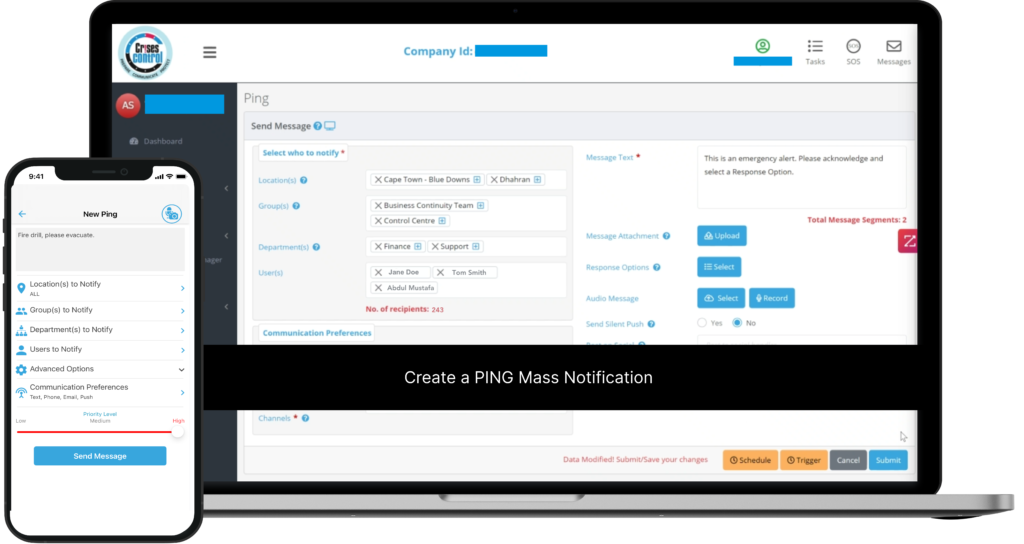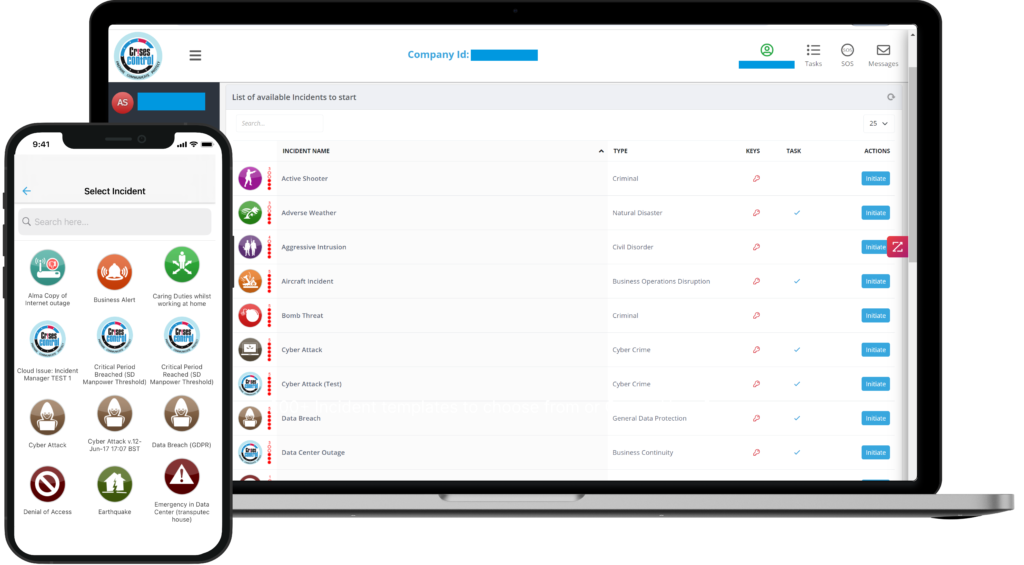Written by Anneri Fourie | Crises Control Executive
In the oil and gas industry, crises can strike at any moment. Whether it’s an oil spill, an equipment malfunction, or a sudden fire on a drilling platform, the consequences can be severe. In these situations, the difference between a manageable response and a catastrophic failure often comes down to communication.
Given the remote nature of many oil and gas operations whether offshore rigs, pipelines, or drilling sites, ensuring seamless communication becomes even more critical. This is where crisis management software, especially mass notification systems, can step in. It ensures that teams in even the most challenging environments are connected, and no one is left out of the loop when every second counts. In this blog, we’ll explore how crisis management software can connect your workforce across drill sites and headquarters, providing you with the tools to manage emergencies effectively.
The Importance of Communication During a Crisis in Oil and Gas
When disasters strike in oil and gas operations, the speed and clarity of communication can make or break your ability to contain the situation. Fires, gas leaks, equipment malfunctions, or even natural disasters can escalate quickly if not handled properly. Effective communication helps mitigate risk and ensures a swift response. Here’s why communication is so crucial during a crisis:
1. Geographically Dispersed Teams
Oil and gas companies often operate across vast and remote areas—offshore platforms, pipeline routes, and isolated drilling sites—far from central command. These dispersed operations make it challenging to keep everyone informed at the same time. During a crisis, any delay in reaching the right people can slow down critical decisions, increase confusion, and elevate the risk to both personnel and infrastructure.
2. Harsh Working Conditions
The conditions in oil and gas operations can be harsh—unpredictable weather, fluctuating technology, and unreliable networks. These factors can significantly affect communication, particularly in critical moments when it’s needed most. Traditional communication methods, like landlines or radios, may not always be enough. A more reliable solution is needed to overcome these challenges.
3. Time-Sensitive Decisions
Emergencies require quick decision-making. The faster your teams are alerted and the quicker actions are taken, the lower the risk to both people and assets. Delays, even of a few minutes, can lead to significant losses. Crisis management systems that deliver real-time alerts can drastically improve your response speed.
How Crisis Management Software Transforms Communication in Emergencies
Crisis management software is designed not only to send alerts, but to ensure that those alerts reach the right people quickly, through multiple channels. These systems ensure your teams are always connected, even when working in challenging environments. Here’s how it works:
1. Deliver Instant Alerts with Multi-Channel Communication
When an emergency strikes, it’s critical to reach your entire workforce—whether they are on a remote offshore platform, at a refinery, or at headquarters. Crisis management software like Crises Control ensures that your messages are sent in real time via multiple communication channels, such as SMS, email, voice calls, and push notifications. This ensures that no matter where your teams are, they’ll receive the alerts they need when it matters most.
2. Stay Connected in Remote Locations
In remote oil and gas locations, connectivity challenges often arise. Whether on an offshore rig or an isolated pipeline station, traditional communication systems can fail when most needed. With Crises Control, your teams are still able to receive alerts through SMS or push notifications as long as there is a connection. This ensures that, even if access to traditional networks is limited, your teams are not left in the dark.
3. Two-Way Communication: Keeping Command Centres Informed
Crisis management isn’t just about sending alerts; it’s equally important to receive updates and requests for assistance from teams in the field. Crises Control offers two-way communication, allowing field teams to send real-time messages back to the command centre. Whether it’s a situation update, a request for more resources, or reporting on progress, decision-makers at the command centre will always have up-to-date and accurate information to adjust their strategy accordingly.
Interested in our Ping Mass Notification Software?
Efficiently alert everyone in seconds at scale with our Mass Notification Software – PING, get the message out fast and ensure rapid response and recovery.

Crises Control: A Game-Changer for Oil and Gas Companies
Now that we’ve looked at the benefits of crisis management software, let’s see how Crises Control specifically supports oil and gas operations:
1. Geo-Targeted Alerts for Swift Action
Crises Control’s geo-targeting functionality allows you to send alerts based on the specific location of the emergency. This means that only the teams who need the information will be notified, saving time and reducing confusion. For example, if there’s a fire in one section of a refinery, only the personnel in that area will receive the alert. This ensures a swift and targeted response, without unnecessary notifications for teams who are unaffected.
2. Incident Reporting and Tracking
Managing a crisis is not just about acting quickly, it’s also about maintaining clear records of every action and update. Crises Control provides detailed incident management tools that allow you to track each step of the response process, from the initial alert to the final resolution. This is crucial not only for maintaining a clear, coordinated response, but also for ensuring compliance with industry regulations and providing a transparent audit trail in case of investigations.
3. Task Management and Coordination
Effective crisis management requires the coordinated efforts of many teams, each with their own responsibilities. Crises Control allows you to create and assign tasks in real time. Whether it’s shutting down equipment, notifying emergency responders, or evacuating a facility, every task is tracked to ensure nothing is missed. For example, in the event of an oil spill, you can assign tasks such as contacting the environmental response team, securing the site, or liaising with local authorities—all in real time, ensuring prompt action and minimal delay.

Interested in our Incident Management Software?
Customise your Crisis Incident Management Software to meet your specific needs with our flexible tools & stay connected and informed during the crisis and incident management process
The Benefits of Using Crisis Management Software for Oil and Gas Operations
Integrating crisis management software into your emergency response plan offers numerous benefits:
- Faster Response Times: Automated notifications and task coordination enable your teams to respond more quickly, limiting the impact of the crisis.
- Improved Safety: Clear communication reduces the chances of mistakes and confusion, protecting the safety of employees.
- Reduced Downtime: A well-coordinated response means quicker recovery and less operational downtime, minimising financial losses.
- Enhanced Compliance: Detailed logs and incident reports provide a clear record of actions taken, supporting compliance with industry regulations and internal audits.
Real-World Application: How Crises Control Supports Oil and Gas Teams
Summary
A leading oil and gas company struggled with communicating critical safety information to its geographically dispersed teams during emergencies. Crises Control’s Mass Notification Software provided an effective solution, ensuring timely alerts and streamlined communication during safety incidents and natural disasters.
Problem
With operations spread across multiple countries and remote environments, the company faced significant challenges in maintaining consistent communication during critical incidents. Delayed notifications and fragmented information flow increased risks to personnel safety and hindered the speed of emergency response.
Solution
Crises Control’s Mass Notification Software delivered a comprehensive and reliable platform for managing emergency alerts and coordinating incident response. The solution allowed the company to push timely, targeted alerts to all employees, whether in the field or at headquarters. By centralising crisis management, the company gained greater control and visibility over their response strategy.
Through the Crises Control mobile app, employees could instantly access crucial updates and instructions, ensuring swift and informed action regardless of their location. Incident coordination was streamlined, with real-time status updates and task tracking enabling teams to respond more effectively to unfolding situations. The result was a faster, more cohesive response to emergencies and improved overall safety outcomes.
“Crises Control has transformed the way we handle emergencies across our global operations. Their platform ensures that we’re always connected, no matter the location.“— Emergency Response Coordinator
Explore More Case Studies
Conclusion: Take Control of Your Crisis Response Today
In the oil and gas industry, effective communication is essential when managing crises. The ability to reach your teams quickly and coordinate their actions can save lives, protect assets, and reduce operational downtime.
Crises Control’s crisis management software ensures that your workforce, no matter how remote, stays informed and ready to respond to any situation.
Don’t wait for the next crisis to realise how important communication is. Book a free demo of Crises Control today and see how our software can transform your emergency response strategy.
Request a FREE Demo









